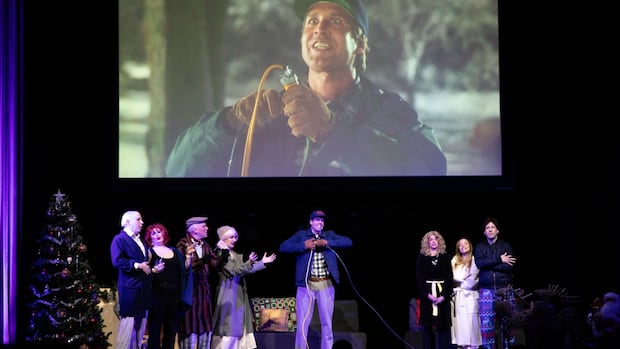Why are so many Canadian festivals struggling or cancelling?

Some of Canada’s most iconic festivals are cancelling or scaling back this year as they weather financial struggles.
Festival organizers say they are still recouping losses from COVID-19 pandemic shutdowns while they contend with inflation, increased competition and a loss of corporate sponsors.
It costs 30 to 40 per cent more to organize a festival this year than it did in 2019, according to Martin Roy, executive director of Festivals and Major Events Canada, and revenues are not following suit.
He noted that many popular festivals are free to the public, which affects them further.
“The sponsors and the grants are not increasing at the same pace as the expenses. So there’s a huge problem there. It’s a basic mathematical problem.”
Fewer laughs, bigger problems
The Just for Laughs comedy festival announced in March it would cancel its long-running event in Montreal and Toronto this summer, laying off 75 employees. It cited reasons including pandemic-related lost revenues and reduced network budgets.
It sparked concerns across the country and highlighted a number of other festivals facing similar struggles.
Sponsors are also pulling out and taking their money with them. Bell, for example, pulled out of the Toronto International Film Festival (TIFF) last year after 28 years, providing millions as its leading sponsor. TIFF cut 12 employees in December, citing effects from the pandemic and the SAG-AFTRA strike.
More events has also meant more competition for available funds.
“I’ve never seen such a situation,” Roy said.
“I can sense that it’s everywhere in Canada.”
The president of Hot Docs, North America’s largest documentary festival, recently said this year’s event could be its last without a boost in funding. Marie Nelson said the Toronto festival, launching April 25, is expanding to become more of a “cultural hub,” with events like author talks, but is still feeling a “hangover” from the pandemic.

“The bottom line is that when you have all of these deficits that you’re carrying with you, it’s like we’re growing and we can see the plane taking off, but we’re just running out of runway,” she said.
Hot Docs also saw a mass exodus of programmers and its artistic director shortly after its announcement.
Toronto’s Taste of the Danforth street festival was cancelled this year, too, with organizers citing a lack of funding.
Hiatuses and near-cancellations
Edmonton’s Fringe Theatre Festival, the biggest and longest-running fringe festival in North America, issued a plea for donations in March and is considering scaling back its outdoor site by about one-third; Toronto’s and Vancouver’s fringe festivals made similar announcements.
Edmonton Fringe director Megan Dart says she is considering increasing service fees for tickets, though 100 per cent of the base ticket price has always gone to artists, and that tradition will continue. She says it’s still recovering from a $3-million loss after having to cancel the 2020 festival.
“Based on industry insights, what was previously believed to be a three- to five-year recovery window in the arts is now being estimated at a 10-year post-pandemic rebuild,” Dart previously told CBC.

The Regina Folk Festival is going on hiatus in 2024 after saying it was facing a serious financial crisis, while the Vancouver folk fest was rescued from cancellation at the last minute last year by a B.C. government grant.
Stagnant federal funding
Losing festivals also means losing revenues for host cities and provinces. Just for Laughs, for example, commissioned a study in 2017 that suggested its festival was adding $34 million annually to Quebec’s GDP.
Quebec boosted funding for its festival aid program in 2022, adding $85 million over three years, but the base budgets for the federal programs have sat at a combined $50.2 million since 2008, leaving a growing number of festivals to compete for smaller portions of funding.
Canada began injecting an additional $15 million per year into the programs in 2019, but those supplements are set to expire in 2026.
Canadian Heritage is “monitoring the situation closely” and will work with festivals to ensure they “can access other support programs” for which they are eligible, said Minister Pascale St-Onge in an emailed statement.
A chain reaction
Jill Wilson, arts and life editor for the Winnipeg Free Press, says each cancelled festival sets off a chain reaction because it can prevent performers, like bands, from block-booking across the country, so other cities end up missing out on acts, as well.
Wilson says there has also been a “massive” drop in volunteers, who help keep these events running.
Festivals in rural Saskatchewan communities in particular have said they are short of festival volunteers, and that they’ve dwindled significantly since the pandemic.
“I think people’s sense of FOMO has really decreased,” Wilson said. “They realized, ‘Oh, I can miss this event. It’s not the end of the world,’ after the pandemic.”
Theatre festival finding success
But some festivals are thriving in the post-pandemic environment.
Ontario’s Stratford Festival, which does Shakespearean theatre, closed its 2023 season with a small surplus, according to executive director Anita Gaffney.
Gaffney says the festival’s expenses have increased about 25 per cent since 2019, but previous investments — like opening the new Tom Patterson Theatre in 2022 — have paid off.
“We’ve made a real priority on investing in the productions and investing in having lots on stage. So there’s lots of good reasons for people to travel to Stratford to purchase tickets and to make donations,” she said.
While the festival is well established, Gaffney said about 30 per cent of last year’s audience was new.
In addition, she credits the festival’s digital content unit, which launched during the pandemic and has continued to expand. Stratford also does outreach events in major markets in Toronto, New York, Chicago and Detroit, and runs a bus service from Toronto to Stratford.
“It takes a thousand things. There’s no silver bullet that makes this work.”
Still, she says, the business is delicate, and when ticket sales start each November, the festival starts over with “essentially nothing” in the bank, needing to make $80 million.
“Our smaller colleagues are in the same boat. You’re taking a big step off a cliff and hoping, like the Roadrunner, you can keep the momentum and not fall off the cliff. It is a challenging time.
“But I also feel a lot of optimism in the marketplace, as well. I think people need what we do.”




